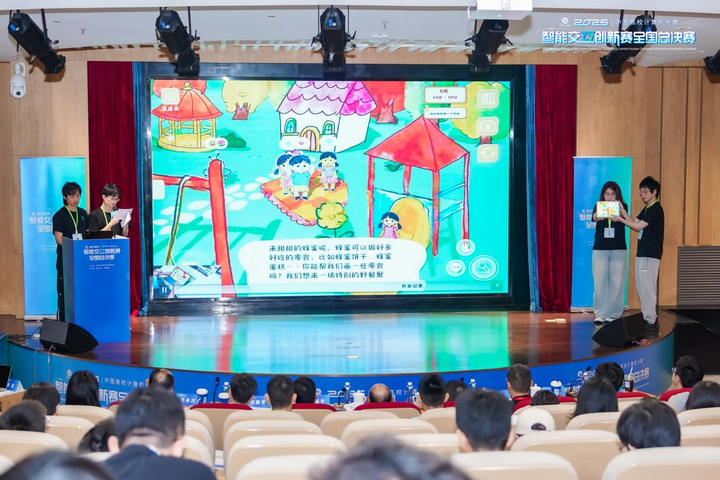Hand Off the Dirty, Tedious Research Work to AI: Shanghai AI Lab Launches FlowSearch Research Agent
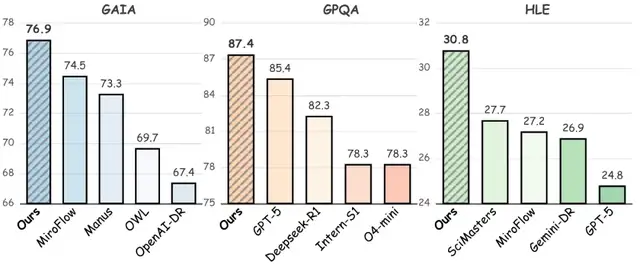
Automating Complex Scientific Processes – Shanghai AI Lab Launches FlowSearch
FlowSearch represents a significant leap in AI-assisted scientific work. On benchmarks such as GAIA, HLE, GPQA, and TRQA, it delivers best-in-class performance—showcasing AI’s ability for dynamic collaboration and deep reasoning in complex scientific tasks.

---
Why This Matters
While AI’s skills in Q&A tasks and standardized tests are impressive, its capability to perform real scientific research is becoming increasingly important.
Scientific research is more than problem-solving or information retrieval—it is:
- Open-ended
- Long-term
- Highly complex
Researchers must:
- Pose original questions.
- Design experiments.
- Integrate multi-source evidence.
- Iteratively form conclusions.
This demands innovative thinking, dynamic reasoning, and precise mastery of interconnected knowledge.
---
What Is FlowSearch?
FlowSearch is a deep scientific research agent powered by dynamic structured knowledge flows. It:
- Builds multi-layer dependency graphs for tasks.
- Operates under a multi-agent framework.
- Enables parallel exploration, recursive knowledge integration, and adaptive workflow optimization.
Unlike traditional closed “input–compute–output” systems, FlowSearch acts as a collaborative research partner—adjusting plans with new information, identifying gaps in evidence chains, and correcting reasoning when off-track.
This marks a shift from AI as a passive tool to an active exploratory partner.
---
Core Modules – FlowSearch’s “Key Team Members”
- Knowledge Flow Planner
- Plans the research route step-by-step, decomposes problems like an expert, and designs tasks hierarchically.
- Knowledge Collector
- Executes tasks, gathers data, and organizes information like a diligent lab assistant.
- Knowledge Flow Refiner
- Reflects on and optimizes results for clarity, coherence, and sustainability.
---
How It Works
- Planner builds an initial knowledge flow graph:
- Nodes = sub-questions or key concepts.
- Connections = knowledge dependencies.
- Agents execute tasks in parallel:
- Collector populates node content.
- Refiner adjusts structure based on results (adding/removing tasks, updating dependencies).
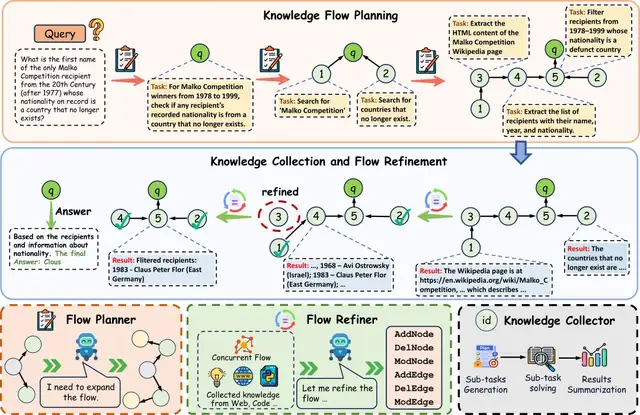
The knowledge graph is a directed acyclic graph (DAG)—freeing reasoning from strict linear order. Multiple exploration paths can unfold simultaneously, with each step traceable and verifiable.
---
Expert-Style Recursive Planning
The Planner module expands tasks layer-by-layer from the core research question until the knowledge flow is complete.
- InternPlanner, a fine-tuned model, learns expert decomposition strategies.
- Collector executes data gathering.
- Refiner reflects and adjusts based on new evidence.
This self-organizing, self-correcting logic ensures global coherence while adapting locally to changes.
---
Benefits of the Design
- Hierarchical decomposition for optimal task granularity.
- Parallel multi-path exploration to improve efficiency.
- Global convergence for complete, consistent knowledge flows.
---
Benchmark Achievements
1. Comprehensive Performance Breakthrough
FlowSearch leads on GAIA, GPQA-diamond, and HLE benchmarks.
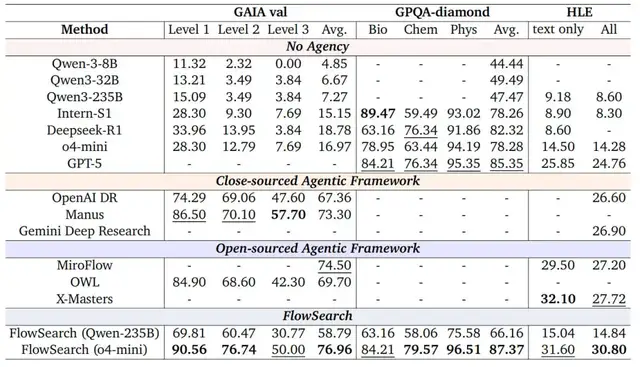
In the biomedical TRQA benchmark, FlowSearch’s general-purpose toolchain surpasses multiple domain-specific models.
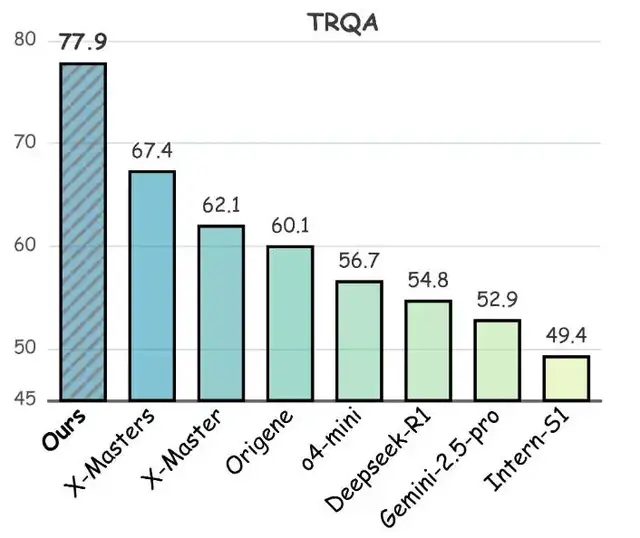
---
2. Module Effectiveness Verification
Disabling Dynamic Knowledge Flow Modeling or the Reflection Module causes performance drops—proving that structured planning and dynamic adjustments are key to reasoning depth and stability.

---
3. InternPlanner Model Training Results
InternPlanner-32B scores ~6 points higher than Qwen-3-32B on GAIA—showing the impact of structured knowledge training on planning and consistency.

---
4. Case Study
Compared to OWL, FlowSearch’s explicit dependency modeling and intermediate result integration avoid evidence loss and logic-chain breaks—ensuring higher transparency and interpretability.
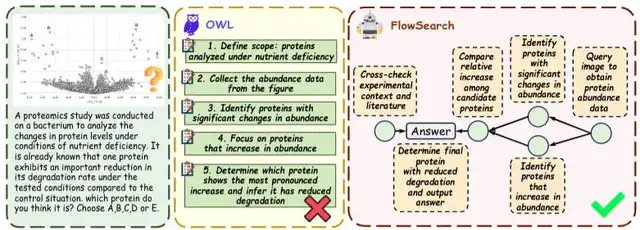
---
Who Benefits From FlowSearch?
- Novice researchers – Gain complete knowledge paths, lowering entry barriers.
- Interdisciplinary teams – Access integrated, multimodal knowledge flows.
- Experienced scholars – Accelerate hypothesis generation, evidence gathering, and report writing.
---
Broader Impact
FlowSearch lays the groundwork for explainable, self-evolving scientific AI agents—equipping AI with thinking, exploration, and self-reflection abilities.
📄 Paper: https://arxiv.org/abs/2510.08521
💻 GitHub: https://github.com/Alpha-Innovator/InternAgent
---
Integration Into the AI Research Ecosystem
Tools like FlowSearch integrate naturally with platforms such as AiToEarn官网, which enable:
- AI-powered content generation
- Cross-platform publishing
- Analytics & monetization
- AI model ranking via AI模型排名
Publishing is supported across Douyin, Kwai, WeChat, Bilibili, Rednote, Facebook, Instagram, LinkedIn, Threads, YouTube, Pinterest, and X—helping transform rigorous research outputs into widely accessible knowledge.
---
Bottom line: With FlowSearch, scientific work shifts from waiting for AI output to exploring together with AI—making AI a true partner in discovery, not just a computational tool.

